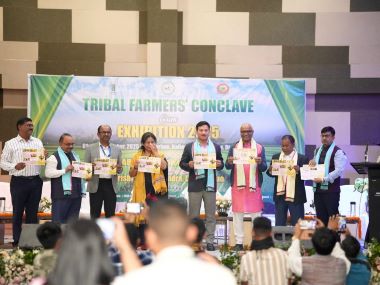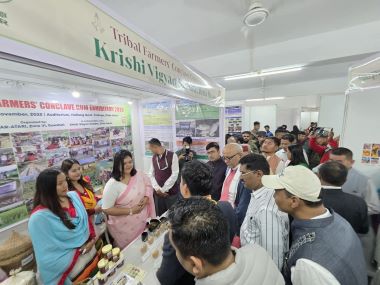6–7 November 2025, Assam
ICAR–Agricultural Technology Application Research Institute, Zone VI, in collaboration with Krishi Vigyan Kendra, Dima Hasao, successfully organised a two-day Tribal Farmers’ Conclave-cum-Exhibition from 6–7 November 2025 in Assam. The event was supported by several ICAR institutes, including ICAR Research Complex for NEH Region, Umiam; ICAR–NINFET, Kolkata; ICAR–NRC on Mithun, Nagaland; ICAR–IVRI, Izatnagar; ICAR–MGIFRI, Motihari; ICAR–CCRI, Nagpur, along with National Fisheries Development Board (NFDB), Hyderabad; Coconut Development Board, Regional Office, Guwahati; and the Spices Board of India.
Shri Debolal Gorlosa, Chief Executive Member, Dima Hasao Autonomous Council, graced the event as the Chief Guest. In his address, he highlighted the crucial role of KVKs in connecting scientific advancements with farming communities. He urged farmers to adopt climate-resilient and value-added agricultural practices, particularly in crops such as pineapple, orange, ginger, and turmeric, which hold high potential in the region.

Smt. Nandita Gorlosa, Minister of Sports & Youth Welfare and Welfare of Minorities & Development Department, Government of Assam, attended as the Guest of Honour. She emphasized integrating Jhum (shifting) and irrigated cultivation systems for sustainable agricultural development and encouraged farmers to embrace natural farming, soil testing, and balanced nutrient management for enhanced productivity.
Delivering the welcome address, Dr. G. Kadirvel, Director, ICAR–ATARI, Zone VI, highlighted the importance of bridging technology gaps in tribal agriculture for sustainable livelihood generation. He announced that KVKs across the region would implement On-Farm Trials on selected technologies and recommend suitable interventions to enhance productivity and income among tribal farmers.
The two-day event featured technical sessions, capacity-building programmes, and an extensive exhibition showcasing innovations, ethnic food products, and successful models in agriculture and allied sectors with a focus on the hill ecosystem of tribal areas. Eminent scientists delivered expert talks on Integrated Farming Systems (IFS) for Climate Resilience, Livestock and Fishery Production with Special Reference to Mithun, Horticultural Prospects in Hill Terrain, and Income Generation through Secondary Agriculture, including mushroom cultivation, vermicomposting, and natural fibre-based enterprises.
An Entrepreneurship Meet was also organised, facilitating direct interaction between rural entrepreneurs, FPOs, financial institutions, and government agencies to explore opportunities in value addition, market linkage, and enterprise development.
Several key initiatives were launched during the conclave, including the release of publications and extension folders, the launch of the KVK Dima Hasao product logo, and the unveiling of a value-added product Ginger Squash, developed under KVK’s technical guidance. Soil Health Cards were distributed among tribal farmers, and outstanding contributors were felicitated under categories such as Best Progressive Farmer, Best Woman Entrepreneur, and Best Artisan.

The conclave witnessed the participation of over 700 delegates, including scientists, progressive farmers, entrepreneurs, FPO/FPC representatives, policymakers, academicians, and stakeholders from agriculture and allied sectors.
The event served as a vital platform to showcase innovations, identify potential enterprises and niche products from tribal regions, promote agribusiness, and strengthen livelihood opportunities in the hill and tribal ecosystems of Northeast India.
The conclave concluded with a collective resolve to strengthen tribal agrarian systems through innovation, entrepreneurship, and inclusive technology dissemination, paving the way for sustainable and resilient rural development in Northeast India.
(Source: ICAR-Agricultural Technology Application Research Institute, Zone-VI, Guwahati)







फेसबुक पर लाइक करें
यूट्यूब पर सदस्यता लें
X पर फॉलो करना X
इंस्टाग्राम पर लाइक करें